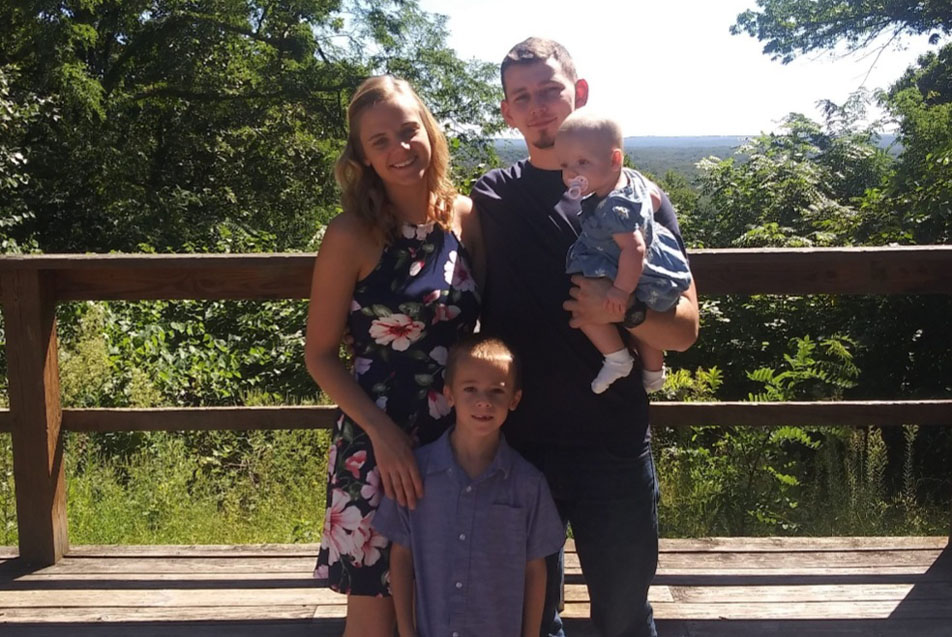
According to the Centers for Disease Control and Prevention (CDC), roughly 795,000 people in the United States have a stroke each year. Sarah Thompson, a young woman who suffered a stroke at the age of 25, was one of these individuals. Unfortunately, stroke can strike at any time, regardless of your age, race or gender. In hopes of empowering others and bringing awareness to the risk factors, we asked Sarah to share the specifics of her story and road to recovery.
How was your health leading up to your health event?
My health before the stroke was not great, especially for my age. For a young woman in her 20s, my blood pressure was very high, and I wasn’t doing much to properly manage it over the last two years.
Can you share what you remember about the day of your stroke?
Leading up to the stroke, I had been experiencing pain in my neck for several months. I chalked it up to merely being sore, resting my neck in an odd position or sleeping on my pillow wrong. On my 25th birthday, the day of the stroke, I woke up early and felt fine. I went to the bathroom, then headed back to bed and fell asleep. Around 9 a.m., I awakened to a completely different situation. Everything was spinning, my hearing was muffled, my entire body was tingling, and I started to vomit.
My first thought was this must be an inner ear problem, but as the minutes ticked by, I knew it was an emergent situation. I needed to get to the hospital. My mom ended up taking me to the emergency department (ED). When we arrived, they wheeled me to the front desk to get checked in, but things took a turn for the worse. I started to slump over in the chair, I couldn’t hear anymore, and I had trouble communicating.
At that point, the emergency department doctor assessed me and immediately activated their stroke protocol based on my symptoms. It’s hard to recall everything, but I remember everyone started asking me a lot of questions. The nurses were flying around the room, getting my IV ready and prepping me for treatment. I was completely unresponsive when Garrett Bennett, MD, PPG – Neurointervention, came into the room.
After being wheeled into surgery, Dr. Bennett found my vertebral arteries, the neck’s major blood vessels that supply blood and oxygen to the brain, were completely blocked. He placed a catheter in my groin and moved it up to my neck. Dr. Bennett tried to stent the left artery first, but the extent of the blockage made it difficult. Luckily, he was able to get my right artery stented, allowing blood flow to my brain. Dr. Bennett ended up placing five stents in my neck and two in my brain once everything was said and done. After surgery, I was taken to the intensive care unit (ICU) and woke up the next day.
What were your thoughts after waking up and hearing your diagnosis?
In all honesty, I wasn’t completely shocked. A little surprised that I was having a stroke at the age of 25, yes, but not shocked. The news wasn’t astonishing to me because I hadn’t been taking care of myself for the last few years. So, when I felt those stroke symptoms that morning, I knew something was horribly wrong, and it wasn’t going to be a minor health event.
Overall, my entire stay with Parkview lasted about two and a half weeks. I received exceptional care from the ICU to the trauma floor to inpatient rehab at Parkview Hospital Randallia. Everyone, including Dr. Bennet, the ED and ICU doctors, staff, nurses, therapists, and techs, was amazing. They were so kind and worked so fast. Time is crucial with strokes, and they didn’t waste it. I believe because they were so responsive when I arrived at the ED, and with every aspect of my care, my recovery was that much easier. Had they not taken those steps, I may not have survived.
Tell us a little bit about your recovery?
My rehab stay was great. The therapists and aides were excellent. It was definitely a struggle at first, but luckily, I didn’t have any long-term mobility issues, weakness, paralysis or impaired speech after the stroke. As for the rehab, I felt good about it. I knew I needed it, and I was ready to get back to normal. I didn’t feel well for so long, so I wanted to jump right in and get back on track with my life.
How are you doing today?
I am fully recovered and doing great! I try to take more time for myself and my health now. I try to sprinkle little breaks and breathers into my day. I feel like I've got a little more pep in my step as I recover, which feels good. I can be the mom I want to be for my family and kids.
I’ve also started eating cleaner, adding more fruits and vegetables to my diet and my family’s diet. I’m drinking more water and trying to incorporate more exercise into my routine each day. I wanted to make sure I kept things going even after my recovery, in hopes of preventing another stroke or other health issues from popping up.
Is there anything you’d like to say to your care team?
I want to thank everyone. They saved my life and took such great care of my family and me. My mom was at the hospital with me every night, so the doctors and ICU nurses really got to know her. Also, I can’t thank Dr. Bennett, Shamir Haji, MD, PPG – Neurocritical Care, Stephanie Falatko, DO, PPG – Neurosurgery, and everyone involved in my care enough. I'm so appreciative of everyone. There are not enough words to express my gratitude. Thank you all!
What would you tell other young people about the risk of stroke?
I would tell them it’s real and they should take care of themselves starting now! Also, please listen to your body. If you feel like something is wrong, don’t wait. Get it checked out. Being young doesn't mean everything is fine. Take the time to see your doctor and find out what's happening in your body. It could save your life.
Remember, stroke is preventable and treatable. Acquiring treatment fast is essential in preventing death and disability from stroke. If you believe you or a loved one are experiencing the symptoms of a stroke, please seek help immediately, BE FAST and call 911.



